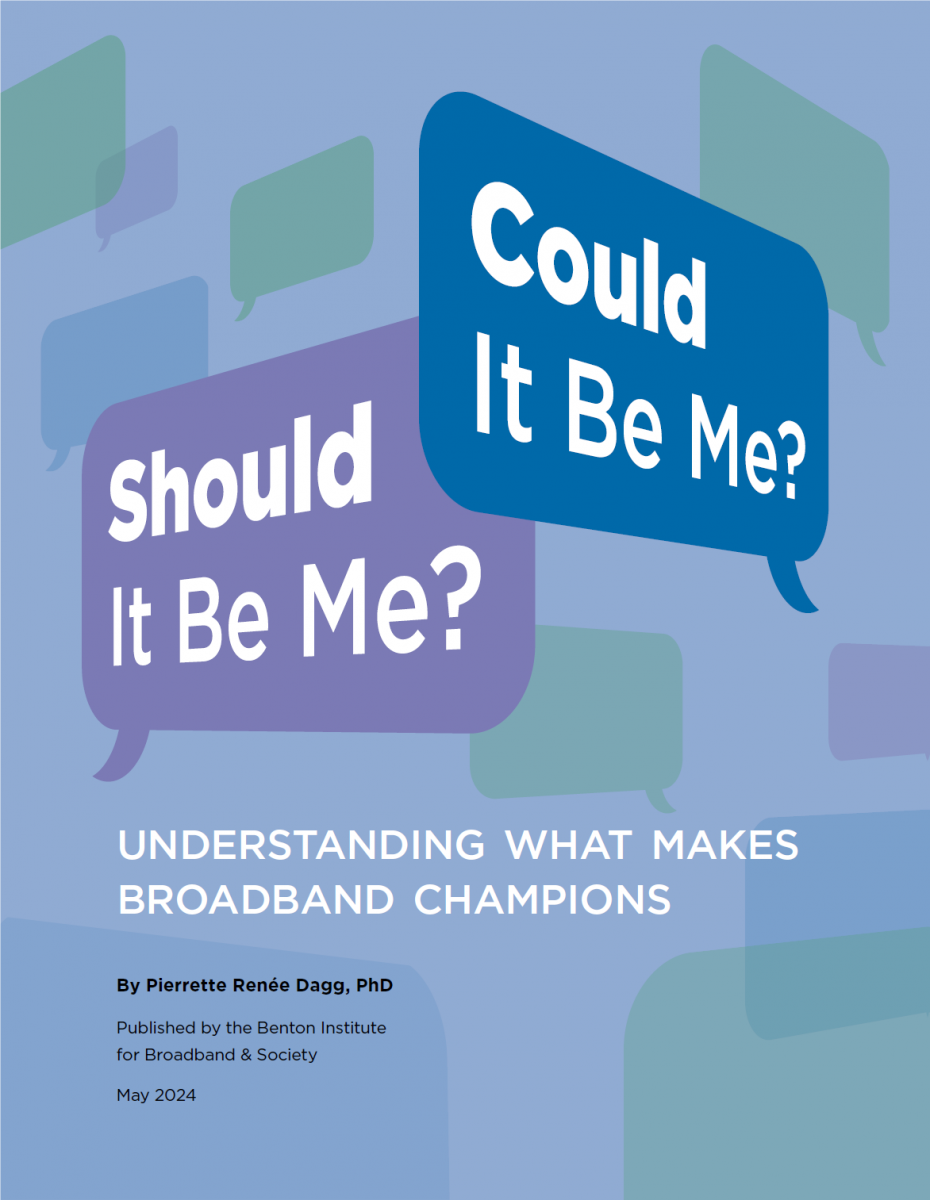Understanding What Makes Broadband Champions
Wednesday, May 8, 2024
Digital Beat
Understanding What Makes Broadband Champions

Broadband champions can be the decisive factors in efforts to improve community connectivity. The work of broadband champions has been shaped by the particularities of their broadband contexts: the local political will, the existing providers, the topography, and the wide-ranging motivations and strategies. What they have in common is their dedication, which has proved to be crucial in helping their communities get high-speed broadband.
Since June 2023, I have published six profiles from various Michigan communities, showcasing how eight broadband champions adapted to the distinct needs and situations of their communities. Today, the Benton Institute for Broadband & Society published Could It Be Me? Should It Be Me? Understanding What Makes Broadband Champions, the results of my examination to understand the stories of broadband community champions and the factors that contributed to their success.
This analysis categorizes the champions based on traits and actions such as technical expertise, formal roles, and leadership self-identification. We have classified their activities based on how they educated, communicated, and inspired stakeholders, collaborators, and the community.
This report examines the broadband champions, drawing from the research presented in the previously published profiles. Analyzing across the profiles, I developed a taxonomy of the different kinds of broadband champions: connectors, multipliers, and visionaries.
Connectors are adept at creating significant personal connections, acting as the social adhesive in communities.
Multipliers are skilled strategists who leverage relationships, knowledge, and resources to methodically achieve their objectives.
Visionaries stand out for their forward-looking plans, aiming for a clear goal and persistently moving toward it.
Champions do not fit neatly in a single category but tend to emphasize one model of leadership over others. The research identifies three key secrets to success. These broadband advocates effectively act as storytellers, validate the importance of ongoing commitment, and demonstrate both resilience and humility in their efforts.
 Champions in this study differed in their profiles, career stages, and backgrounds, and hailed from diverse communities across Michigan. One commonality among the group was champions' fervent desire to improve broadband availability in their communities. However, whether or not they had prior technical knowledge, had official responsibilities within their municipality, or saw themselves as a leader varied considerably.
Champions in this study differed in their profiles, career stages, and backgrounds, and hailed from diverse communities across Michigan. One commonality among the group was champions' fervent desire to improve broadband availability in their communities. However, whether or not they had prior technical knowledge, had official responsibilities within their municipality, or saw themselves as a leader varied considerably.
While every champion played a crucial role in enhancing community connectivity, their achievements ranged from passing local funding measures to obtaining substantial investments worth tens of millions, to making use of existing middle-mile infrastructure. Their tactics differed, but similarities emerged among the champions. As the individual profiles demonstrate, the ability of each leader to educate, communicate, and inspire those around them was critical to the success of their efforts.
This examination of the qualities and approaches of broadband champions aims to help others who may be considering an active role in improving connectivity for their community. By understanding qualities and archetypes of champions, those who want to improve connectivity can understand context-specific strategies and tactics that are effective and adaptable to their local communities. They can also, hopefully, see the many ways to be effective broadband champions and realize that yes, it could be them.
Please join me for a webinar on May 22nd at 1 PM ET for a discussion about the crucial role broadband champions play in addressing the connectivity needs in their communities. Together, panelists will share the stories of broadband community champions and the factors that contributed to their success. As more communities devise their own broadband solutions leveraging federal funding, examination of broadband champions can help us understand what makes for successful efforts that are responsive to community needs. Please RSVP for the event here.
Dr. Pierrette Renee Dagg is a Benton Institute Digital Opportunity Fund Fellow, the Director of Technology Impact Research at Merit Network. The aim of her work is to bridge the gap between academic scholarship and practical application to advance issues of technology understanding and information equity.
The Benton Institute for Broadband & Society is a non-profit organization dedicated to ensuring that all people in the U.S. have access to competitive, High-Performance Broadband regardless of where they live or who they are. We believe communication policy - rooted in the values of access, equity, and diversity - has the power to deliver new opportunities and strengthen communities.
© Benton Institute for Broadband & Society 2024. Redistribution of this email publication - both internally and externally - is encouraged if it includes this copyright statement.
For subscribe/unsubscribe info, please email headlinesATbentonDOTorg






